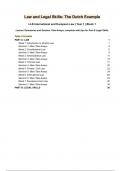College aantekeningen
Law and Legal Skills: Complete Course Notes
- Vak
- RGPAR510AD
- Instelling
- Rijksuniversiteit Groningen (RuG)
These edited and reviewed notes of the LLS course of Year 1, Block 1 of the LLS Programme provide a detailed overview of everything within LLS: The Dutch Example, from week-by-week lecture notes to an overview of each seminar and the most important take-aways. In addition to this, a summary as to h...
[Meer zien]




